What are the treatment options for knee problems?
Written by:Top Doctors recently had the chance to speak with leading consultant trauma and orthopaedic surgeon, Mr Akash Patel. Here, in this article below, Mr Patel tells us how knee problems can best be prevented, and outlines the main treatment options for patients suffering with knee issues.

What are the most common symptoms of knee problems?
The most common symptoms of knee problems include pain, stiffness, swelling, catching, clicking, locking, giving way, and difficulty bearing weight on the knee.
How can knee problems be prevented?
Preventing knee problems involves maintaining good knee health and reducing the risk of injuries. Here are some tips for prevention:
1. Maintain a healthy weight: excess weight puts added stress on the knees, increasing the risk of knee problems, especially osteoarthritis.
2. Stay active: regular exercise helps strengthen the muscles around the knee, providing better support and reducing the risk of injury. Low-impact activities like swimming and cycling can be knee-friendly.
3. Warm-up and cool down: proper warm-up and stretching before exercise, and cooling down afterward, can help prevent strain and injuries.
4. Use proper footwear: wear shoes that provide good support and cushioning, especially when participating in sports or activities that involve running or jumping.
5. Avoid overuse: don't overexert your knees with repetitive high-impact activities. Give your knees time to rest and recover.
6. Strengthen muscles: Incorporate strength training exercises that target the quadriceps, hamstrings, and calf muscles to support knee stability.
7. Maintain flexibility: stretch regularly to maintain good joint flexibility and prevent stiffness.
8. Use proper technique: if you're involved in sports or physical activities, learn and use correct techniques to minimize the risk of injuries.
9. Be cautious with high-impact sports: activities like basketball or football can put stress on the knees. Be mindful of your movements and take precautions.
10. Listen to your body: if you experience pain or discomfort in your knees, don't ignore it. Seek medical advice and address any issues promptly to prevent them from worsening.
Remember, individual factors like genetics can also play a role in knee health, so some issues may be unavoidable.
What are the main causes of knee pain?
Knee pain can be caused by various factors and underlying conditions. Some of the main causes of knee pain include:
- Osteoarthritis: the most common cause of knee pain. It is a degenerative joint disease that results in the breakdown of cartilage in the knee joint.
- Rheumatoid arthritis: an autoimmune disease that can affect the knees and other joints, causing pain and inflammation.
- ACL, MCL, OR PCL tears, meniscus tears, fractures, and injuries, that can all result from accidents, sports injuries, or falls.
- Tendonitis: inflammation of the tendons around the knee, often due to overuse or repetitive motions.
- Bursitis: inflammation of the bursae (small fluid-filled sacs) around the knee joint, which can be caused by repetitive movements or trauma.
- Runner's knee: characterised by pain in the front of the knee, often associated with running and jumping.
- Gout: a type of arthritis that can lead to sudden and severe knee pain due to the build-up of uric acid crystals in the joint.
- Infections: in rare cases, knee pain can be caused by an infection in the joint.
- Tumours: though rare, bone tumours can lead to knee pain.
- Overuse and wear and tear: ageing and prolonged stress on the knee joint can lead to general wear and tear, resulting in knee pain.
- Hip and spine pain: pain in the knee can be referred from hip and spine problems.
How is the cause of a knee problem diagnosed?
Taking a full history, knee examination and organising investigations can help to diagnose knee problems. The most common tests include X-rays, MRI scans, CT scans, and ultrasound scans.
How are knee problems treated?
The treatment depends on the cause. Options include non-surgical and surgical treatments. Non-operative measures include painkillers, physiotherapy, activity modification, lifestyle changes, heat/ice packs, knee braces, weight loss and injections. The most common surgical options include arthroscopy (keyhole surgery), specific ligament/cartilage/knee cap procedures and knee replacements.
If you’re interested in booking an appointment with Mr Akash Patel, head on over to his Top Doctors profile today.


